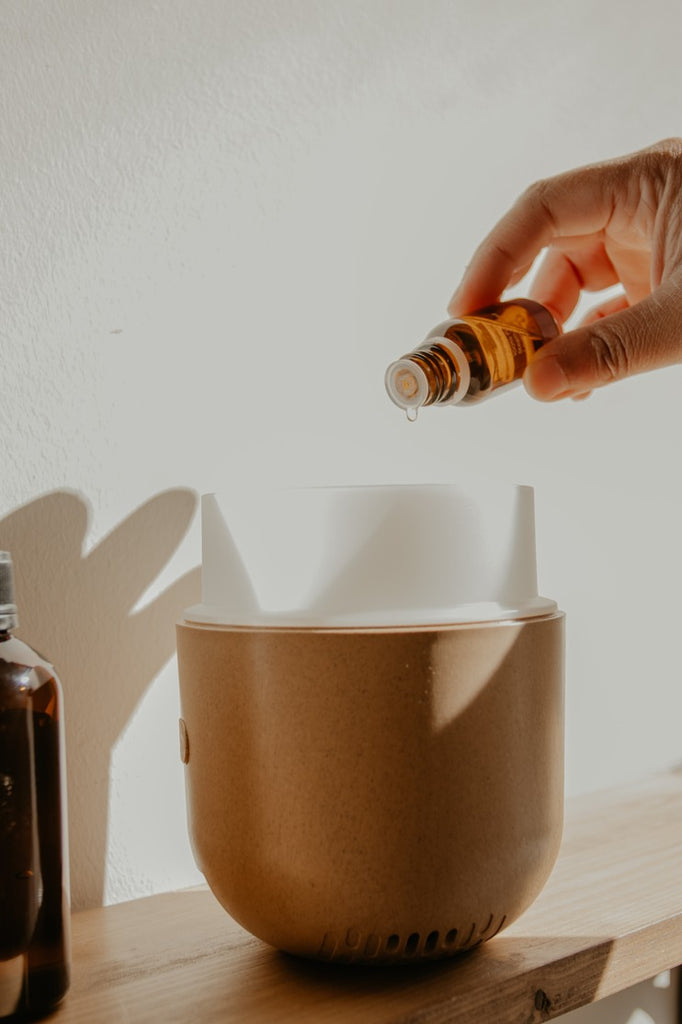
Essential oils and diffusers have become essential tools for enhancing well-being and creating a pleasant atmosphere at home. But understanding how to use them safely and effectively is crucial. In this detailed blog post, we'll delve deeper into three common questions about using essential oils and diffusers in your everyday life.
How many drops of essential oil do you need?
Essential oils are concentrated, which means you only need a small amount to achieve the desired effect. The number of drops required varies based on your intended use:
- Diffusing - For aromatherapy purposes using a diffuser, a good rule of thumb is 3-5 drops of essential oil for every 100ml of water. This ratio is typically effective in creating a pleasant ambiance without overwhelming your senses. However, if you have a larger room, you might need a slightly higher concentration.
- Topical Use - When using essential oils on your skin, it's essential to dilute them with a carrier oil. A common guideline is to use a 1-2% dilution rate, which equates to 1-2 drops of essential oil per teaspoon of carrier oil (e.g., coconut, jojoba, or almond oil). This dilution ensures that the essential oil is safe for direct contact with your skin.
- Skin Care - For facial or sensitive skin applications, consider an even lower dilution rate of around 0.5-1%. Some essential oils can be harsh on delicate facial skin, so using less is often more beneficial.
- Bath - Adding essential oils to your bath can be a luxurious and relaxing experience. Typically, 5-10 drops of essential oil in a full bathtub are sufficient to infuse the water with a delightful aroma.
Remember that individual sensitivity and the potency of the specific essential oil can influence the number of drops you need. It's always a good practice to start with a lower quantity and adjust as needed to find your perfect balance.
Is it bad to put too much essential oil in a diffuser?
Yes, using excessive amounts of essential oil in your diffuser can lead to several issues. Here's why you should avoid it:
- Overpowering Aroma - Using too much essential oil can result in an overwhelming and unpleasant scent. Rather than creating a calming atmosphere, it can become suffocating and uncomfortable.
- Wastefulness - Essential oils can be pricey, and using more than necessary is wasteful. Diffusers work efficiently with just a few drops (usually 3-5 drops) of essential oil for every 100ml of water. Using more can quickly deplete your essential oil supply.
- Safety Concerns: Overuse of essential oils in a diffuser can lead to respiratory problems and allergic reactions, especially for those with sensitivities or allergies. Some oils, when used excessively, may trigger headaches, nausea, or other adverse reactions.
- Potential Diffuser Damage - Excessive oil in the diffuser can clog the unit and lead to malfunction or damage. Cleaning such build-up can be challenging and may shorten the lifespan of your diffuser.
To ensure a safe and enjoyable experience, always follow the manufacturer's guidelines for your specific diffuser. They typically recommend a specific number of drops of essential oil per millilitre of water. Starting conservatively and increasing the quantity if necessary is a smart approach.
Is it okay to diffuse essential oils every day?
Diffusing essential oils daily can be a part of a healthy and enjoyable wellness routine for many people, but it's essential to be mindful:
- Sensitivity - Some individuals may be more sensitive to essential oils than others. If you're new to using essential oils, start with short diffusing sessions and observe how your body responds. If you experience any discomfort, such as headaches or respiratory issues, consider using essential oils less frequently or choosing milder oils.
- Variety - To prevent olfactory fatigue, where your body becomes less responsive to a scent over time, rotate between different essential oils. Prolonged exposure to the same oil daily can reduce its effectiveness.
- Duration- Short, intermittent diffusing sessions (30-60 minutes) are typically more effective and safer than continuous, long-term diffusing. Allow time for your body to rest between sessions.
- Ventilation - Ensure proper ventilation in the room where you're diffusing essential oils. Opening windows or doors periodically can help refresh the air and prevent the build-up of essential oil vapours, especially in smaller or enclosed spaces.
- Quality of Essential Oils - Always use high-quality, pure essential oils from reputable sources (hello 👋 ) . Low-quality or adulterated oils may contain synthetic additives or impurities that can have adverse effects when diffused regularly.
- Individual Health Conditions- If you have underlying health conditions, allergies, or respiratory issues, consult with a healthcare professional before using essential oils daily. Some oils may not be suitable for individuals with specific medical conditions.
- Pets and Children - Be cautious when diffusing essential oils around pets and young children. Some essential oils can be toxic to animals or may cause respiratory irritation in children. Always research and use pet-safe or child-friendly essential oils when needed.
Diffusing essential oils every day can be a part of a healthy and enjoyable wellness routine for many people. However, it's important to use them mindfully, paying attention to your body's responses and ensuring proper ventilation. If you have any concerns or medical conditions, consult with a healthcare professional before incorporating daily diffusing into your routine, and be cautious with pets and children around.
